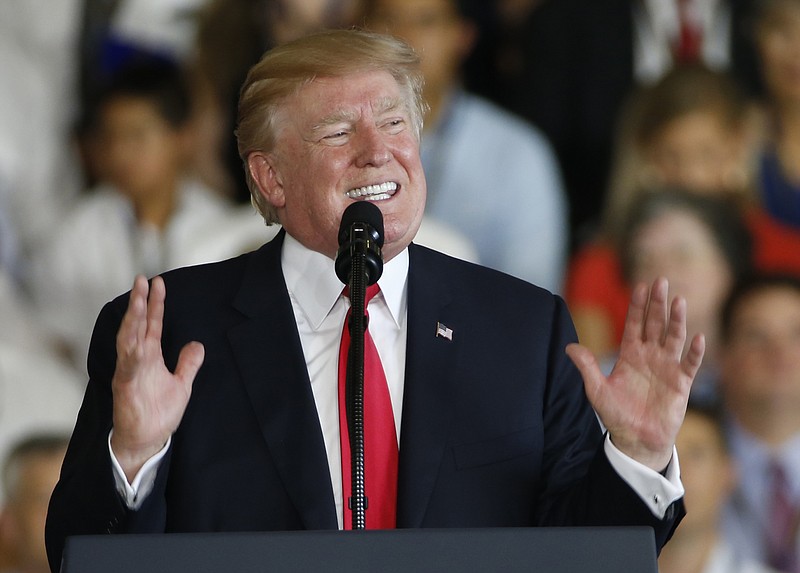President Donald Trump occasionally reminds us of comedian Norm Crosby.
Crosby, for those not of a certain age, parlayed his hearing problem into a career of malapropisms, which are the mistaken and often funny uses of a word or phrase in place of similar sounding ones.
The comedian, for instance, recalled when his career was in its "infamy," referred to ripping the "cartridge" in his knee, complained about the uncomfortable "humility" in the air, said he liked to drink "decapitated coffee," was told to speak from his "diagram," and enjoyed receiving a "standing ovulation."
Trump last week said "with the exception of the late, great Abraham Lincoln, I can be more presidential than any president that has ever held this office."
We have to admit the line made us laugh, not because it was the kind of malapropism Crosby used, not because he lofted himself to a position above 42 other presidents but because of the phrase's nonsensical meaning.
Trump, apparently, was riffing on the oft heard criticism of him not acting "presidential" for his frequent tweets, his bashing of friend and foe alike, and his expansionist language.
But his adding a degree to the term "presidential" struck us as funny.
Was President Harry Truman, who made the decision to end World War II by using atomic weapons, more presidential, for instance, than President John F. Kennedy, whose steely decision-making during the Cuban Missile Crisis in 1962 helped avert World War III?
Was President Ronald Reagan, whose negotiations with the USSR helped bring an end to the Cold War, more presidential than President Richard Nixon, whose entreaty to China in time brought that country out of Third World status?
Or was President Lyndon Johnson, who signed the Civil Rights Act of 1964, more presidential than President Franklin Roosevelt, who signed the Social Security Act?
President Trump has done nothing to equal any of the aforementioned decisions. We would argue, though, that he has the moxie of some of those presidents by rolling back regulations and reversing executive agreements signed by President Obama in an era of superheated rhetoric and superpartisan politics. Other Republicans probably would not have attempted it.
The same goes for taking on big issues. The president has said he wants to repeal and replace the Affordable Care Act, reform the tax code and halt illegal immigration, all items that have been on the agendas of the majority of the American people. Again, many of those candidates in the 2016 Republican primary race with him would not have moved so quickly, if at all, on those issues.
Trump's extended remarks indicate he understands the term "presidential" to mean what we all think it means - that acting presidential is moving deliberately, speaking cautiously and acting carefully. That isn't and hasn't ever been Trump.
Being presidential is "really easy," he said, but "we have to move a little faster than that."
We admire Trump for taking on the big ticket items, for making bold predictions and for being willing to answer his critics, something that Republicans have been loathe to do - to their great disadvantage - since Reagan was president.
But "presidential" presidents do a number of things we hope the 45th president can look to. Here are just a few:
- On North Korea, look to President George H.W. Bush, who used personal diplomacy and not threats to start building the coalition he called the "New World Order" that eventually would extricate Iraq from Kuwait.
- On infrastructure, look to President Dwight Eisenhower, whose World War II insight helped persuade him to create the interstate highway system.
- On charming your critics, look to President Ronald Reagan, whose ability to work with House Speaker Tip O'Neill helped the Republican president move legislation through a Democratic House.
- On making unpopular decisions with an eye on the future, look to President Gerald Ford, who pardoned former President Richard Nixon for any crimes he may have committed during Watergate but which helped the country get past the scandal. (Note: This is not to suggest Trump think about pardons of anyone or everyone he knows who ever had contact with anyone or anything Russian.)
- On surprising your critics, look to President Chester A. Arthur, a tool of his era's corrupt civil service, who went against type and reformed the system instead.
- On making promises, look to President James K. Polk, who outlined a few definite goals for his administration, fulfilled them and left after one term.
We don't believe Trump is about to give up tweets or criticism of whomever displeases him on a given day, so we suggest the presidential strategy of accomplishments. Despite his personal demeanor, if he is able to call on the inspiration of a few of his predecessors, as mentioned above, and accomplish what he promised the American people he would, he can take his place up there with the most "presidential" of presidents. But not until then.
